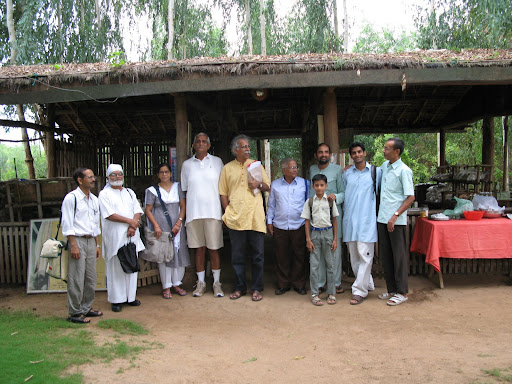
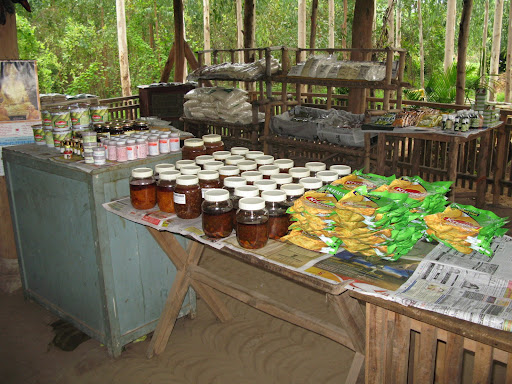 I just spent the day at a 40-acre wonder, the organic farm of Sarvadamanbhai Patel, located near Anand in Gujarat. After spending only 30 minutes there I knew it was unlike any other farm in all of India. Kapilbhai, who knows a thing or two about organic farming, told me it is the most diverse and systematic organic farm in all of India.
I just spent the day at a 40-acre wonder, the organic farm of Sarvadamanbhai Patel, located near Anand in Gujarat. After spending only 30 minutes there I knew it was unlike any other farm in all of India. Kapilbhai, who knows a thing or two about organic farming, told me it is the most diverse and systematic organic farm in all of India.I couldn't see why not. The place was just stunning, I can't do it justice with pictures and words. You enter from the main road and are met by a store where he sells his organic produce. The amount of vegetables in that shop was more than the three organic shops in Baroda combined,
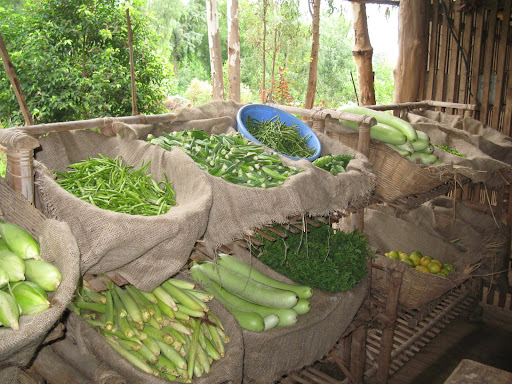 and this was just from one farm! And he had organic vegetables that you rarely see in Baroda (though he is a limited supplier to Amidhara, Jatan's organic produce outlet in Baroda). The shop itself was lovely, with a beautiful golden wood roof and pleasant arrangement of products. We had a phenomenal breakfast of sweet corn, fafras, bananas, pears, pakoras, and sugar cane juice/tea/coffee. I was in heaven. The food was amazing, I didn't want to stop eating.
and this was just from one farm! And he had organic vegetables that you rarely see in Baroda (though he is a limited supplier to Amidhara, Jatan's organic produce outlet in Baroda). The shop itself was lovely, with a beautiful golden wood roof and pleasant arrangement of products. We had a phenomenal breakfast of sweet corn, fafras, bananas, pears, pakoras, and sugar cane juice/tea/coffee. I was in heaven. The food was amazing, I didn't want to stop eating.We then walked around part of the farm to see some other wonders. This is where the Disneyworld title comes into play. All the attractions, all the thrills you can ask for on an organic farm are here. Sarvadaman
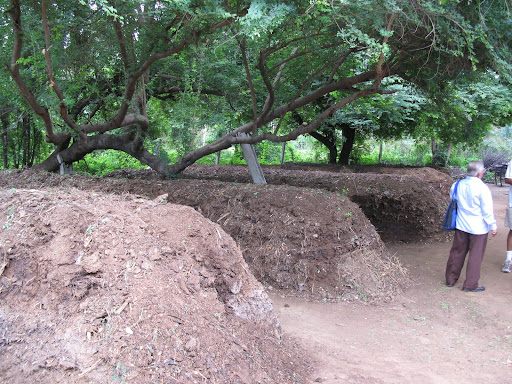 literally has the best compost/manure consistency, the most earthworms per kg soil, the happiest cows, and the most efficient use of water and wood of any farm. He has the coolest machines not because of their horsepower or modern parts but because of their creativity. For example there is a fountain pond which is used to essentially "massage" the water that will go into a crop. The fountain makes the water fall unevenly and mix in special ways so that the microbes in the water get stimulated and multiply which will be good for the soil that it goes into.
literally has the best compost/manure consistency, the most earthworms per kg soil, the happiest cows, and the most efficient use of water and wood of any farm. He has the coolest machines not because of their horsepower or modern parts but because of their creativity. For example there is a fountain pond which is used to essentially "massage" the water that will go into a crop. The fountain makes the water fall unevenly and mix in special ways so that the microbes in the water get stimulated and multiply which will be good for the soil that it goes into.And the way in which things are laid out, the
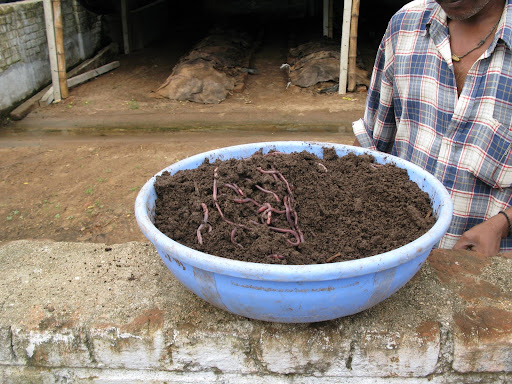 process by which the labor works (most of everything including turning the manure piles is by hand), etc. are so well thought out. When you hear Sarvadaman speak, you know how much thought went into everything. He is like an organic farming encyclopedia; he lives and breaths agriculture. You can tell it's his passion. If you ask him about any topic related to agriculture, be it how to increase or decrease the pH of your soil, the benefits of horse manure over cow, the importance of sawdust as a compost input, the correct concentration of manure in compost (way less than one would think), the proper time of year to turn your compost, the best time in the lunar calendar to sow corn, the benefits of biodynamic methods... you name it he knows it
process by which the labor works (most of everything including turning the manure piles is by hand), etc. are so well thought out. When you hear Sarvadaman speak, you know how much thought went into everything. He is like an organic farming encyclopedia; he lives and breaths agriculture. You can tell it's his passion. If you ask him about any topic related to agriculture, be it how to increase or decrease the pH of your soil, the benefits of horse manure over cow, the importance of sawdust as a compost input, the correct concentration of manure in compost (way less than one would think), the proper time of year to turn your compost, the best time in the lunar calendar to sow corn, the benefits of biodynamic methods... you name it he knows it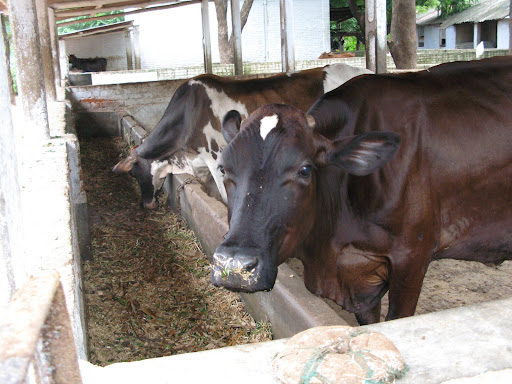 because he's tried it in his natural laboratory. To be fair, he is western educated and has an advanced degree in agriculture science, but his achievements are nonetheless extraordinary. His grandfather was a legendary politician and social worker in Anand, and is credited for establishing the nation's best agricultural academic institutions in Anand. Sarvadamanbhai himself is also a renowned gardener, "the best in Gujarat" says Kapilbhai, managing the Sardar Patel memorial garden and other famous landmark gardens in the area.
because he's tried it in his natural laboratory. To be fair, he is western educated and has an advanced degree in agriculture science, but his achievements are nonetheless extraordinary. His grandfather was a legendary politician and social worker in Anand, and is credited for establishing the nation's best agricultural academic institutions in Anand. Sarvadamanbhai himself is also a renowned gardener, "the best in Gujarat" says Kapilbhai, managing the Sardar Patel memorial garden and other famous landmark gardens in the area.The purpose of our visit besides to see the farm was to hold a Managing Council meeting of the
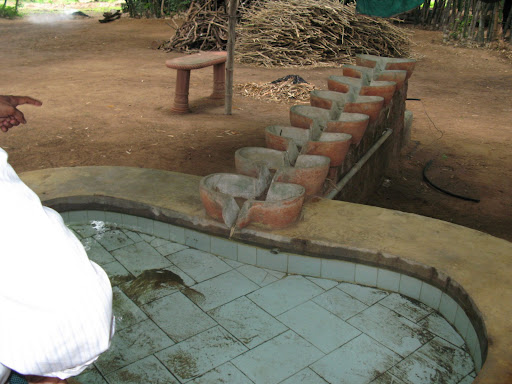 Organic Farming Association of India (OFAI), the most prominent (and perhaps only) national-level NGO focusing on organic farming promotion for marginal farmers. The council members had flown in the day before and Kapilbhai/Jatan was the host of this month's meeting. It was a privilege to have been a part of the meeting. Kapilbhai and I even presented the latest version of our scorecard system, which now had a labeling scheme along with it. We had fancy colored handouts showing how the system worked, but overall it was not positively received. I'm afraid we have much to do back at the drawing board, but Kapilbhai seems less moved by the criticisms. I think we are heading
Organic Farming Association of India (OFAI), the most prominent (and perhaps only) national-level NGO focusing on organic farming promotion for marginal farmers. The council members had flown in the day before and Kapilbhai/Jatan was the host of this month's meeting. It was a privilege to have been a part of the meeting. Kapilbhai and I even presented the latest version of our scorecard system, which now had a labeling scheme along with it. We had fancy colored handouts showing how the system worked, but overall it was not positively received. I'm afraid we have much to do back at the drawing board, but Kapilbhai seems less moved by the criticisms. I think we are heading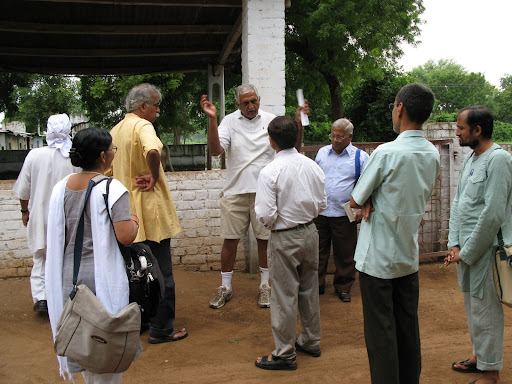 in the wrong direction with our approach in a few ways, particularly with respect to the level of complexity we've introduced to a system that's meant to be understood by ordinary consumers and eventually maintained by farmers. It will be interesting going forward where we will take this.
in the wrong direction with our approach in a few ways, particularly with respect to the level of complexity we've introduced to a system that's meant to be understood by ordinary consumers and eventually maintained by farmers. It will be interesting going forward where we will take this.The meeting was held in the middle of an amazing bamboo forest. It was there that we had an amazing lunch of organic shaaks and lovely makkhi ki roti (corn roti) along with other awesome stuff all on a long narrow table made from a tree trunk cleaved in half and laquered to an amazing golden color. Honestly, it was the
 best day of food I've had during my stay in India. It almost certainly had to do with the environment I was in and the freshness and purity of the ingredients. It was while sitting there enjoying my lunch that I realized that this farm is the hope for the future. It is an indicator of what is possible with organic farming. I'm not saying it makes organic farming the answer, but I think it once and for all silences the critics about its potential.
best day of food I've had during my stay in India. It almost certainly had to do with the environment I was in and the freshness and purity of the ingredients. It was while sitting there enjoying my lunch that I realized that this farm is the hope for the future. It is an indicator of what is possible with organic farming. I'm not saying it makes organic farming the answer, but I think it once and for all silences the critics about its potential.After the meeting and lunch we toured some more around the farm, and I took more pictures and walked around with my jaw on the floor. 40
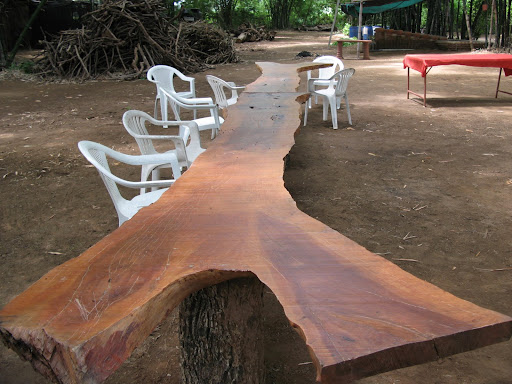 different varieties of vegetables grow on this farm, and another probably 10-15 fruits. The way it's set up is so beautiful... as you walk through it between plots you see something different growing to the left and right, ahead and behind. Kapilbhai told me that at any single time of the year, you can come to the farm and see some crop being sown, something else at mid-stage, and something else being harvested. That kind of balance and diversity is the secret ingredient.
different varieties of vegetables grow on this farm, and another probably 10-15 fruits. The way it's set up is so beautiful... as you walk through it between plots you see something different growing to the left and right, ahead and behind. Kapilbhai told me that at any single time of the year, you can come to the farm and see some crop being sown, something else at mid-stage, and something else being harvested. That kind of balance and diversity is the secret ingredient.I could probably go on and might have missed something, but really this is a sight to see in
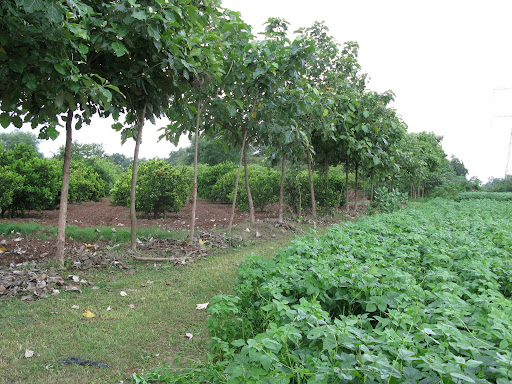 person, right up there with the Taj. Really. I'm already planning my trip back. My mom must see this place (which reminds me, have I mentioned the my mom will be coming to India in two weeks? She will be staying with me at the Ashram where she will be receiving treatment in the Naturopathy hospital as she continues to recover from GBS. I'm totally excited and I'm pretty sure the treatment and relaxation will do her good).
person, right up there with the Taj. Really. I'm already planning my trip back. My mom must see this place (which reminds me, have I mentioned the my mom will be coming to India in two weeks? She will be staying with me at the Ashram where she will be receiving treatment in the Naturopathy hospital as she continues to recover from GBS. I'm totally excited and I'm pretty sure the treatment and relaxation will do her good).
Neil,
ReplyDeleteWhy is the score card not well-received? Is it a technical issue on your part? or are farmers not willing to adopt it because it is contrary to their normal farming patterns?
Also, what are the implications of organic farming for soil life? Can this type of farming be reproduced on a mass scale? Is that the goal?
Yo Pav,
ReplyDeleteMainly the OFAI people thought the scheme was too complicated. The two main barriers to certification for small farmers currently are cost and complexity. OFAI has as a goal creating certification programs that minimize the amount of paperwork that the farmer and farm appraiser (note they don't call them inspectors, as a key feature of their systems is to encourage farmers and offer support through a mentor relationship with the appraiser) have to do. They thought a scorecard will be too much work, but they really missed the point because what we were proposing was not our scorecard per se, but just the concept of a certification that allows a farmer to be 65% organic or 35% organic instead of a binary organic or not. We also wanted them to consider turning their existing appraisal forms into scorecards to make the appraisal process more streamlined. But they misunderstood our proposal as a replacement for the systems they have come up with, and so they got defensive (IMHO).
The other point that I agreed with is that our labeling scheme allowed for too many variations, because in our scheme a single farmer could have different colored labels for different crops. That will probably be too confusing for a customer.
Regarding your questions about the productivity of organic farming, there are numerous studies that suggest that organic farms have comparable yields to conventional farms. Check out the wikipedia article on organic farming for some initial pointers to the studies, and if you want more info email me. Also check out Vandana Shiva's writings if you can... she's an absolute baller.
And if organic farming is about anything, it is about treating the soil as a living organism. Conventional farming attempts to "improve" on the work of natural processes in the soil by introducing external inputs which kill off earthworms and other useful elements of a self-maintaining soil system and in the process create a dependency on further introduction of external inputs. I could go on about this as well, but email might be better
Hey Neil,
ReplyDeleteI intend to visit this farm near Anand. Could you please tell me the address and contact details. Also, if there are any such other farms around?
Thanks and Regards,
Hi,
ReplyDeleteI want Sarvadmanbhai's Farm's add. of Anand. is anyone there who giv me his add. or contact no...???
I also visited the Navdanya's organic farm in Dehradun and it was so serene and peaceful. We could understand what is organic farming all about. For more details and pictures and more about organic food, please visit us at www.esvasa.com Seema
ReplyDeletewww.boxtree.in
ReplyDeleteFarmers as well as the public are unaware of health problems that lie behind the modernized farming practices. First they must come out of this modernized farming thinking and return to traditional organic farming practices and know its importance.
ReplyDeleteDiscover the purity of nature with Nimbark Foods' organic farming products. Our range includes fresh fruits, vegetables, and grains, all grown without harmful chemicalsOrganic Farming Products Enjoy the health benefits and rich flavors of sustainably sourced, eco-friendly produce. Choose Nimbark Foods for a healthier
ReplyDeleteDiscover the purity of nature with Nimbark Foods' organic farming products. Our range is cultivated without chemicals, ensuring freshOrganic Farming Products eco-friendly choices for your family. Embrace health and sustainability with Nimbark Foods, where every bite celebrates the goodness of organic farming. Experience nature's best
ReplyDeleteAt Nimbark Foods, we are committed to promoting health and sustainability through our organic farming products. Our range includes organic pulses, grains, spices, and herbal supplements, all cultivated without synthetic pesticides or fertilizers. Organic Farming Products By choosing our organic products, you support environmentally-friendly practices and enjoy food that's rich in nutrients and flavor. Discover the benefits of our farm-fresh, chemical-free offerings and join us in fostering a healthier planet and lifestyle. Explore our selection today and experience the purity of organic farming.
ReplyDelete
ReplyDeleteNice Information on organic farming
it's a nice info our services
ReplyDeleteWell explained! Climate-smart farming techniques are essential for sustainable crop production. Keep sharing!
ReplyDeleteBest Agrochemical formulations.
Discover the finest selection of organic groceries at Nimbark Foods, your trusted organic grocery store . We offer a wide range of high-quality, chemical-free, and sustainably sourced products to support your healthy lifestyle. Shop conveniently online and embrace the benefits of organic living with nutritious and eco-friendly choices.
ReplyDeleteVery informative post on how agrochemicals are supporting modern agriculture
ReplyDeleteBest Agrochemical suppliers in India.
Great post! MYLO Rides makes commuting so simple! Whenever I search for Shuttles Near Me, their service always pops up with reliable, comfortable, and affordable travel options. Visit us for more!
ReplyDeleteShuttles Near Me
Really interesting perspective on how organic farming can offer a magical transformation.
ReplyDeleteBest Crop Protection Solutions.
Great post! I’ve been using Shuttles Near Me from MYLO Rides, and the service is excellent! Always on time, clean buses, and super convenient for daily commutes. Visit us for more!
ReplyDeleteShuttles Near Me
Loved this post! If you're looking to enhance your space with premium water features, check out the trusted Fountain Dealers In Delhi at The Fountains Store. They offer top-quality designs and reliable solutions perfect for homes, gardens, and commercial projects.
ReplyDeleteGreat post! Thanks for sharing this helpful information. I recently used Reddy Anna Book, and the platform provides a smooth, secure, and reliable experience. For users looking for a trusted service, reddy anna is definitely worth checking out.
ReplyDeleteGlobal presence is a sign of a Reliable Food Exporter. Fortune Exicom is a well-known Food Exporter and Manufacherur that follows food safety rules and delivers on time.
ReplyDeleteBull India is a leading manufacturer of Backhoe Loaders, Skid Steer Loaders, and Tractor Attachments. Our machines rival global brands like JCB Backhoe Loader and JCB Machine in performance and durability. Built for Indian conditions, Bull delivers power, precision, and reliability. Choose Bull India – trusted for innovation in every load and lift.
ReplyDeletebackhoe loader | skid steer loader | tractor attachment | jcb backhoe loader | jcb machine